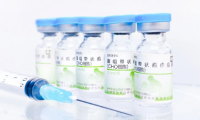-
AstraZeneca’s Tagrisso combination approved by FDA for advanced lung cancer
- Source: drugdu
- 554
- February 22, 2024
-
ABPI publishes new prescribing support guide for healthcare professionals
- Source: drugdu
- 374
- February 22, 2024
-
ASTRUM-004 Featured on the Cover of Cancer Cell
- Source: drugdu
- 407
- February 22, 2024
-
Hengrui Medical made a new breakthrough in the field of medical nuclide preparation and successfully prepared 64Cu in batch.
- Source: drugdu
- 299
- February 22, 2024
-
Spit Test Detects Breast Cancer in Five Seconds
- Source: drugdu
- 597
- February 21, 2024
-
Accurate Blood Test for Detecting Malignant Brain Tumors Could Help Patients Avoid Risky Surgery
- Source: drugdu
- 638
- February 21, 2024
-
FDA Grants Accelerated Approval to Iovance’s Amtagvi for Unresectable or Metastatic Melanoma
- Source: drugdu
- 476
- February 21, 2024
-
How Digitizing Data Collection and Analysis in Biopharma Can Drive Better, Faster Insights
- Source: drugdu
- 519
- February 21, 2024
-
FDA Approves First Cellular Therapy to Treat Patients with Unresectable or Metastatic Melanoma
- Source: drugdu
- 462
- February 21, 2024
your submission has already been received.
OK
Subscribe
Please enter a valid Email address!
Submit
The most relevant industry news & insight will be sent to you every two weeks.

















